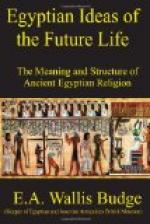CHAPTER III.
THE “GODS” OF THE EGYPTIANS.
Throughout this book we have had to refer frequently to the “gods” of Egypt; it is now time to explain who and what they were. We have already shown how much the monotheistic side of the Egyptian religion resembles that of modern Christian nations, and it will have come as a surprise to some that a people, possessing such exalted ideas of God as the Egyptians, could ever have become the byword they did through their alleged worship of a multitude of “gods” in various forms. It is quite true that the Egyptians paid honour to a number of gods, a number so large that the list of their mere names would fill a volume, but it is equally true that the educated classes in Egypt at all times never placed the “gods” on the same high level as God, and they never imagined that their views on this point could be mistaken. In prehistoric times every little village or town, every district and province, and every great city, had its own particular god; we may go a step farther, and say that every family of any wealth and position had its own god. The wealthy family selected some one to attend to its god, and to minister unto his wants, and the poor family contributed, according to its means, towards a common fund for providing a dwelling-house for the god, and for vestments, etc. But the god was an integral part of the family, whether rich or poor, and its destiny was practically locked up with that of the family. The overthrow of the family included the overthrow of the god, and seasons of prosperity resulted in abundant offerings, new vestments; perhaps a new shrine, and the like. The god of the village, although he was a more important being, might be led into captivity along with the people of the village, but the victory of his followers in a raid or fight caused the honours paid to him to be magnified and enhanced his renown.
The gods of provinces or of great cities were, of course, greater than those of villages and private families, and in the large houses dedicated to them, i.e., temples, a considerable number of them, represented by statues, would be found. Sometimes the attributes of one god would be ascribed to another, sometimes two or more gods would be “fused” or united and form one, sometimes gods were imported from remote villages and towns and even from foreign countries, and occasionally a community or town would




